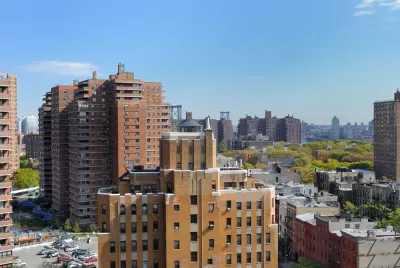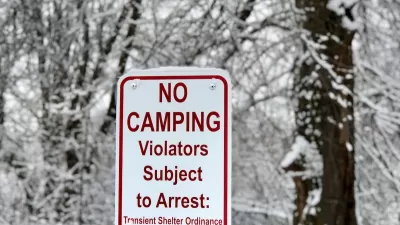Upzoning efforts, while hugely controversial, often make only a small impact on housing supply, particularly in the short term. Could a return to government-built housing be the solution?

Around the country, cities are struggling to stop a growing housing crisis through developer incentives and rezoning efforts that encourage more housing production. But Daniel Denvir and Yonah Freemark write that “the typical effects of upzoning are rather modest, especially in the short term.” Writing in Slate, Denvir and Freemark argue that perhaps policymakers should look to “an obvious but long-taboo solution: building new public housing.”
The concept of public housing gained a notorious reputation reputation in many U.S. cities thanks to misguided (or outright discriminatory) policies and underresourced projects that failed to meet the needs of their residents. But this is starting to change, according to the authors.
Generally thought of as only for the very poor, government-funded and publicly owned housing—sometimes called social housing—would guarantee affordable housing for people across income ranges by adding to the national housing supply and offering new opportunities for vibrant, mixed-income neighborhoods.
The authors point to proposals that create a new model for public housing that differs from past models in key ways. “First, it would largely be funded at the state and local level. Second, the housing is intended not just for the very poor, but rather for a wide swath of residents, which could compliment public subsidy to finance more construction.”
One U.S. example exists in Montgomery County, Maryland, where “the Housing Opportunities Commission quietly initiated a program to build mixed-income public housing that uses a cross-subsidy financing system: the market rents paid by more affluent tenants to subsidize affordable units in the same building.” And subsidizing public housing is one of the best uses of government funds, the authors claim. “By generating jobs in construction, public housing development acts as a countercyclical stimulus measure, boosting employment in a critical sector with significant multiplier effects across the entire economy.”
FULL STORY: Just Build the Homes

Alabama: Trump Terminates Settlements for Black Communities Harmed By Raw Sewage
Trump deemed the landmark civil rights agreement “illegal DEI and environmental justice policy.”

Study: Maui’s Plan to Convert Vacation Rentals to Long-Term Housing Could Cause Nearly $1 Billion Economic Loss
The plan would reduce visitor accommodation by 25% resulting in 1,900 jobs lost.

Planetizen Federal Action Tracker
A weekly monitor of how Trump’s orders and actions are impacting planners and planning in America.

Wind Energy on the Rise Despite Federal Policy Reversal
The Trump administration is revoking federal support for renewable energy, but demand for new projects continues unabated.

Passengers Flock to Caltrain After Electrification
The new electric trains are running faster and more reliably, leading to strong ridership growth on the Bay Area rail system.

Texas Churches Rally Behind ‘Yes in God’s Back Yard’ Legislation
Religious leaders want the state to reduce zoning regulations to streamline leasing church-owned land to housing developers.
Urban Design for Planners 1: Software Tools
This six-course series explores essential urban design concepts using open source software and equips planners with the tools they need to participate fully in the urban design process.
Planning for Universal Design
Learn the tools for implementing Universal Design in planning regulations.
Caltrans
Smith Gee Studio
Institute for Housing and Urban Development Studies (IHS)
City of Grandview
Harvard GSD Executive Education
Toledo-Lucas County Plan Commissions
Salt Lake City
NYU Wagner Graduate School of Public Service





























